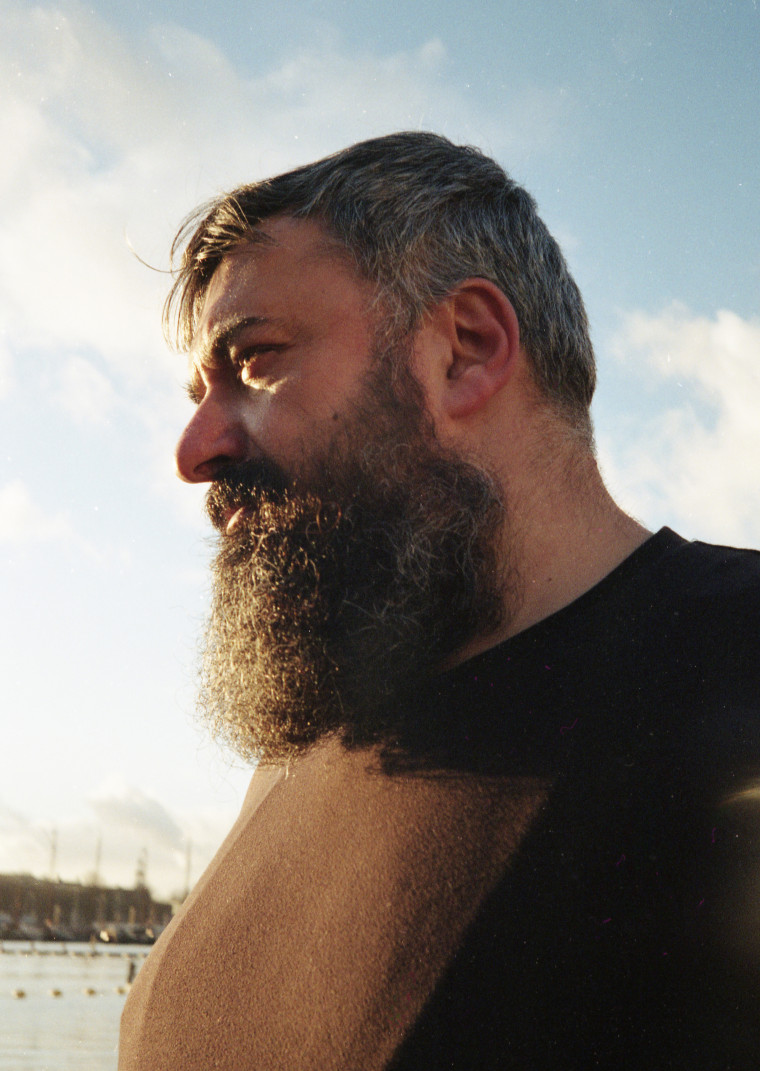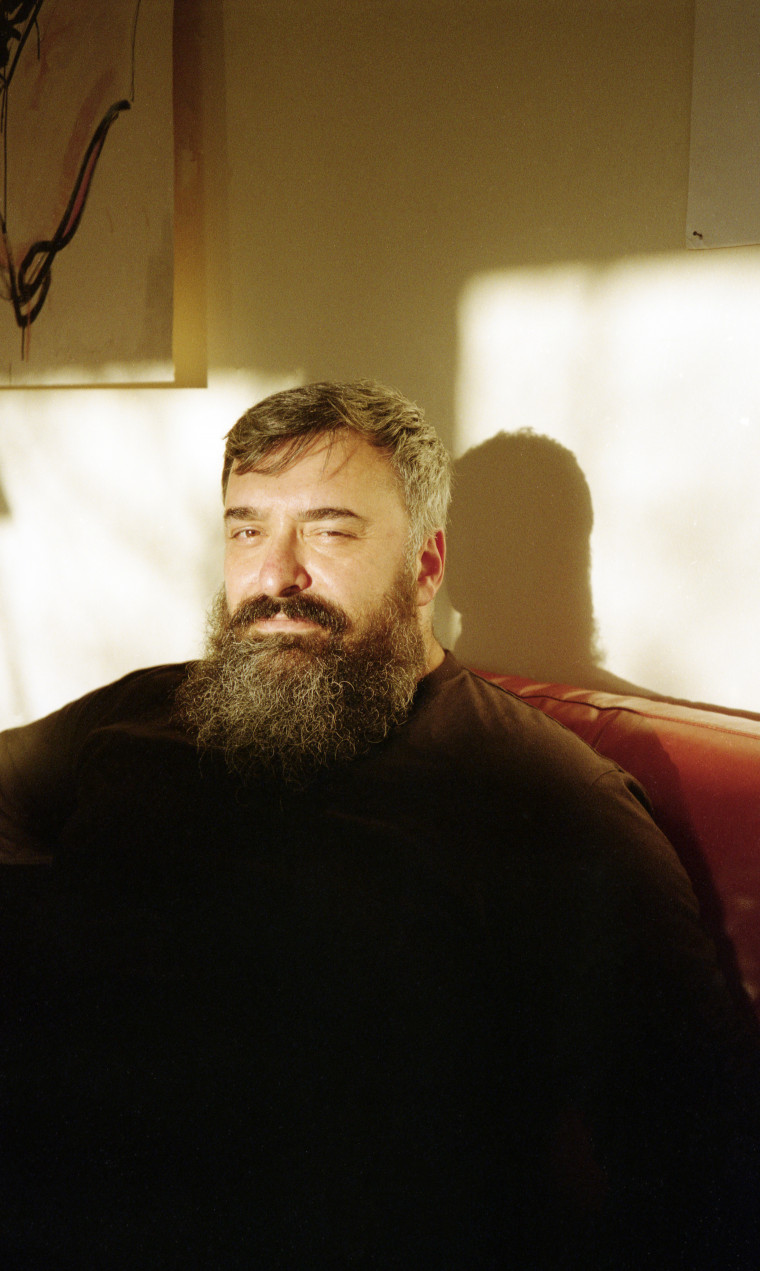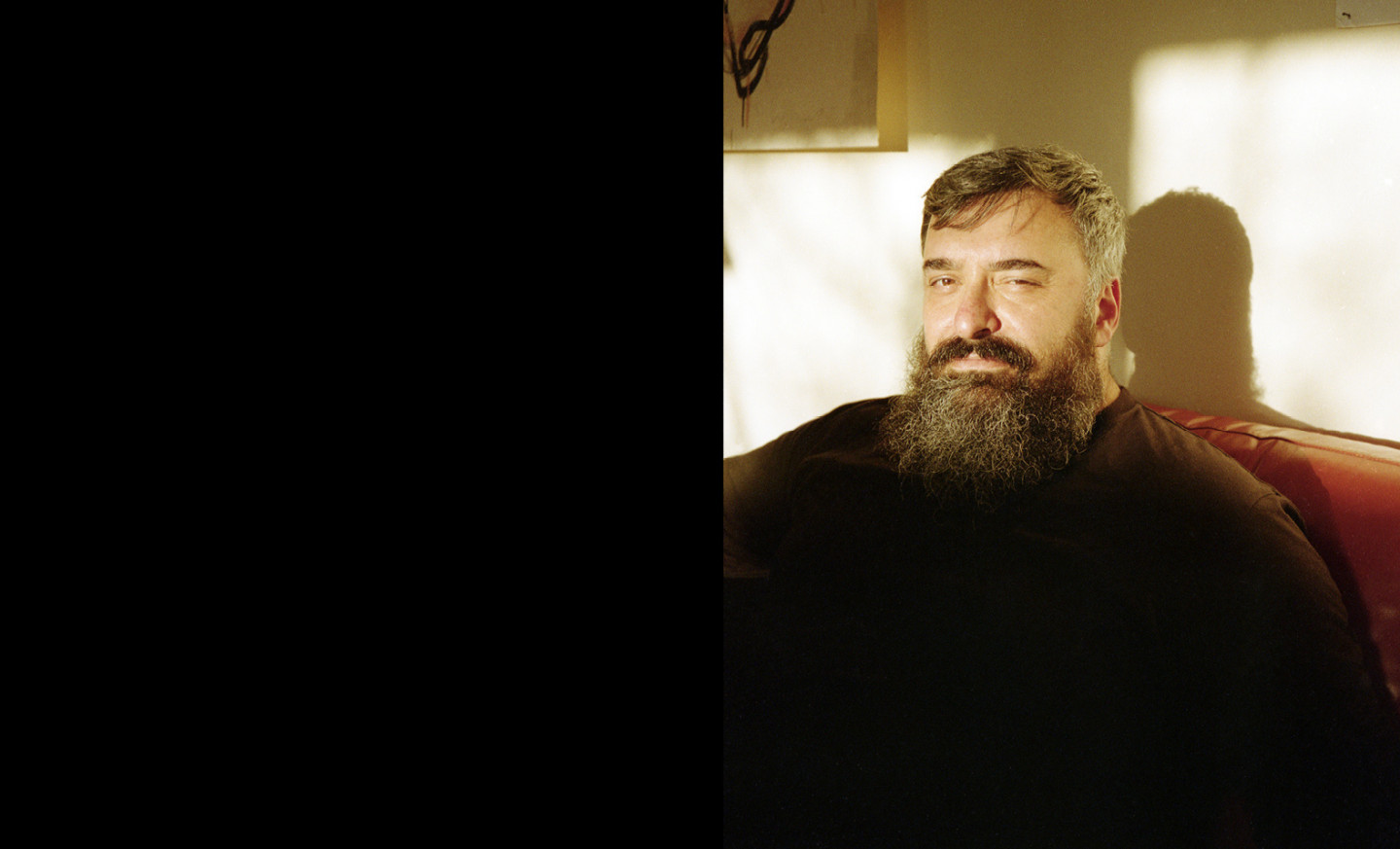He’s graced the Dekmantel Selectors line-up for the past three years, and we couldn’t imagine a summer without him: Rabih Beaini. Blurring boundaries wherever he appears, the Lebanese, globetrotting producer, DJ and label owner surprises through sound as much as he loves being surprised by sound.
Words by Leendert Sonnevelt
Photography by Françoise Bolechowski
How to convey Beaini’s various goings-on to a casual? Well, you could tell them that he’s released mind-altering techno on his (now 15-year-old) Morphine imprint, scored the work of filmmaker Vincent Moon, curated the influential CTM Festival in Berlin and farther afield, given Indonesian music its own series of Berghain nights... and that’s just a teeny fraction of it all. Ahead of surrendering to Beaini’s inimitable trance once more in Tisno – and please do feel free to join for the ride – we caught a glimpse of the artist’s mastermind.
Hi Rabih. I dove into the releases, research, collabs and performances that make up your vast sonic sea. There is so much to discover and I couldn’t help but wonder: how do you structure and navigate all this?
Total anarchy! [Laughs] I think I’m not disciplined enough to organize even a day. So I take all things as they come, following the flow. Ideas come and go, I think about how to develop them and with whom. Throughout my life I’ve always been curious about different things so I got in touch with many different realities in music, which allows me to be very flexible. Ideas come from very different places: the club scene, the improv and experimental scene, dance and theatre… I don’t have a boundary in that sense; the only requirement is that it has to be interesting. I’m moving more and more into experimental stuff and into sound art, but I keep a special place for parts of my beloved club scene. Dekmantel has always been there throughout the DJ-sets and live performances that I’ve done.

What fascinates me about your work is its wide spectrum. From a performance with Tomoko Mukaiyama at Muziekgebouw to a beachside set at Selectors, how do they relate?
Somehow, in my mind, these things unfold in the exact same way. It’s all the same; the only difference is how you apply the pressure. There’s a different pressure when you have a crowd in front of you that’s there to dance, and rightfully so, and a crowd of listeners, connoisseurs, those who know the difference between a good and a bad musician. To me they’re all on the same level, but the pressure I’m talking about is more of a professional thing. I’m being paid for providing music, essentially, and that’s my main focus: how can I deliver something proper and professionally made for this specific crowd? Yet I don’t make any distinction: I approach production, label management or a collaborative concert, like a DJ set. I started as a DJ and everything I do is still that. In my head sounds are mixed together. It’s all about how I can combine, close to perfection, different sources. Whether that source is a record or an instrument I’m playing – it’s the same thing, it’s the same source. The thing about DJ sets is that I now approach them more as a compositional work. Not everyone might catch what I do when I combine three or four things. It could sound a bit chaotic, but in my head I’m creating something new out of various sources, like a band.
What state of mind do you hope people will bring to any of your performances?
That’s interesting. I think I can acknowledge a certain state of mind by putting myself in these different positions; I’m not invading a new territory where I don’t know the crowd or don’t know how the crowd is approaching this thing. Throughout all club and party experiences, I can see the crowd wanting to have fun and being very curious. Today’s generation, especially, is exposed to everything, so there is much more knowledge and much more openness. If they hear a piece with a certain sound in it, most can recognize the provenience of that piece even if they don’t know the piece. It almost becomes a game or a play between the crowd and me. Imagine you’re dancing to disco, house or techno, and then there’s this weird guy who plays gamelan at 3am. How far can I go? Even if you’re here with the sole purpose of having drinks with friends, what is your reaction? That’s my point. Where can I take the crowd, beyond what they expect? It’s playful but it can also be dangerous because sometimes I can push a bit too far… I enjoy that. [Laughs] Most of the time the crowd in front of me surprises me as much as I’m surprising them.
"Everywhere in the world people dance and they have different approaches to rhythm, from very complex to very simple. The way I can combine these things holds the challenge, but also the fun."
At a festival like Selectors you’re one of the DJs who plays the most non-western sounds. Are you saying a crowd today is more receptive to that than a few years ago?
Definitely. For me it’s not so much a choice of playing non-western music, but the conception of dance music in the western world is very branded and limited – unfortunately – to the genres that we know here, from hip-hop to techno and drum‘n’bass. In every other culture, people dance to other things as well. That’s my conception of dance music: global dance music. I’ll still play Chicago jack beat or a techno piece, especially the really new rhythms and curious things coming from Africa or Asia. There’s a lot of very interesting electronic stuff coming out today that is definitely not locked in the familiar BPM mode. I’m not quitting on electronic music; actually, it’s becoming more and more exciting to me. What I play fits more in the free form and in the freedom of global dance. Everywhere in the world people dance and they have different approaches to rhythm, from very complex to very simple. The way I can combine these things holds the challenge, but also the fun.
When did you first feel the urge to share and mix music that you found?
It came gradually. My approach to music was never unilateral. Well, honestly, it might have been in the very beginning, when I was still living in Lebanon and snobbing traditional Lebanese music just to be ‘cool’ with the young guys. But I was immediately pending towards the rhythms in Lebanese traditional music, trying to make a connection with whatever I was playing at the time. It was harder because of the medium; I only used vinyl then because there were no CD players that were able to perform this way. I almost got locked within the medium that I was using. Throughout the years this became less, until recently I decided not to play on vinyl anymore (while still purchasing it and pressing on vinyl). The things I’m doing today come from that choice. I’m definitely not against technology, and it doesn’t mean that everybody should stop playing vinyl, but the freedom that I need is given to me only by the new technology that I’m using.
How was vinyl restricting you?
Well, it’s a limiting medium. In some ways I was finding very creative ways to play stuff: cutting the records live, or lifting the needle and dropping it in different points on the record, for instance. But I needed a bit more. I needed a pitch that could go far down or up. These media players today have incredible features that, obviously, vinyl turntables will never have – unless someone invents something new. [Laughs] Also, I was a bit tired of the recklessness of a lot of promoters, where you arrive at a venue and the turntables are not even connected yet. You have to play after somebody, feedback everywhere… you don’t perform and you don’t deliver. So at some point it became a choice to only play from my USB sticks.
I’d love to discuss the meaning of “trance” since the term – mostly as a genre – is back in full force. How would you define a trance? Do you purposely try to create one for your audience?
Yes. Purposely? I don’t know, but I end up there somehow. In many cultures trance is the result of celebration – whether it’s a healing process or some spiritual or private event such as a wedding. I don’t necessarily want people to go into trance; that’s not my end goal. But somehow it sometimes becomes inevitable.
"But the thing is: from the church to the mosque to the synagogue, in Buddhism and in Hinduism, all religions, music is used constantly to attract you to a realm."
What about being entranced yourself?
I don’t particularly recognize it but I do enter it, and I always have. I remember DJ sets where at some moment I totally didn’t realize what happened in the last half hour. In those cases I don’t even remember the tracks that I played – but this happens in rare moments, where it’s a collective thing. The moments where everything almost reaches a point of perfection: the lights, the sound, the tracks, the response from the crowd… This energy can be light but at some point it can also become heavy. It can become a trap where you lock yourself into a dark moment with the crowd. You come out of that and think: what did I do? I said I don’t recognize it because I don’t know what a trance is physically – but this might be it… There are people that train for a state of trance in proper trance celebrations. I’ve never had a chance to do that, but music is so powerful. It’s a shame to lock it down to one genre, one sound or one type. That’s the thing I keep saying: we’re missing out on so much, on so many experiences. Even in the club, the experience can be one of healing.
Totally. The comparison to church is often used in club culture, but it does make sense.
Yes, it’s the exact same thing. We always try minimise the role of religion or religious ceremonies in our lives because of the demonisation of religion today – right or wrong, I’m not going into that now. [Laughs] But the thing is: from the church to the mosque to the synagogue, in Buddhism and in Hinduism, all religions, music is used constantly to attract you to a realm. The call for prayer in Islam is one of the most beautiful melodies, the sound of the bells in Christianity… all these are attractive sounds, so you’ll be hooked and follow. That’s what we do too as musicians, performers, producers; we want to give something catchy, something that attracts people to enter or follow a genre, scene or club.

The palette of music that you present is so much broader than that of many other DJs. Do you ever run into situations where you have to explain yourself or perhaps even justify what you do?
Not that, definitely not. I’m in a place where, even if the crowd and people present don’t know me, they know I do something different. It’s happened very rarely, maybe in one or two situations, that I was the wrong guy in the wrong place. If I had to explain myself it would be because I did something wrong or unprofessional but I did not… there was simply a miscalculation from the person that threw the event. For instance, when before me there was this technohead and after me there was a technohead, playing for an ultra-mainstream techno crowd. I don’t blame them and I don’t blame myself, but still I suffer from that. I suffer when a number of people didn’t enjoy what I did. Not because of my ego but because I would like to cover as much as possible in what I do – and I realize that’s not possible at all. Nobody can do that. People are different and like different things, but I try my best and that’s all I can do. I still have my feet on the ground; I’m not expecting to make everyone love something because I love it or because I’m passionate about it.
With your upcoming performances in mind, what’s something you’re currently listening to a lot?
I very much go with the flow. Whatever happens to a player around me is a blessing. Of course I always look around and search for things that could work with what I do, that’s my job. At the same time I like to be surprised, and things I haven’t heard before constantly surprise me: stuff in library music, archives, field recordings by friends or from my own trips. Like I said earlier, the electronic music scene I’m facing today comes exactly from that background; it’s great how they translate traditional music into some super weird beat patterns or synth sounds. Also, I could argue that there is a lot of negligence on the professional side of the music scene. People go to the easier thing – just look at the comeback of disco, trance or rave. I could enjoy that for one night, but I can’t see it becoming the main thing. There is so much new and fresh stuff coming out that’s amazing. We should step out of that bubble of “we lived it in the nineties, so the new generation should live that now”. Refresh things somehow! People from different places on the planet are doing just that, and that’s what I love right now.
